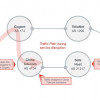Offensive worm spreading worldwide - Offensive trojan likely to stall
A new script that can severely limit user access to infected systems is spreading slowly worldwide, antivirus companies said.The program, a Trojan horse, called either Trojan.JS.Offensive or Trojan.Offensive, can make Windows desktop icons invisible, can prevent users from starting programs or shutting down Windows and even persists when a machine is being used in safe mode, according to information posted on Symantec Corp.'s antivirus Web site. Luckily for users, Symantec doesn't see wide distribution of the worm yet.
Trojan.Offensive arrives in users' e-mail in-boxes as an HTML e-mail, though it could also be a Web page found on the Internet, if someone posted it there, Symantec said. The Trojan, written in Javascript, presents a button that reads "Start" which, when clicked, activates the script. A variant of the Trojan activates when the file is opened and lacks the "Start" button. When the Trojan is executed, it proceeds to make a series of system-level changes to the configuration of the infected PC, greatly limiting user access to the system.....
'Offensive' worm spreading worldwide
The Trojan exploits a ten-month-old security hole in Microsoft Corp.'s Java Virtual Machine, said Craig Schmugar, a virus researcher with McAfee's AVERT Labs. Systems which have had the patch Microsoft released applied are not vulnerable, he said.
The combination of an attack tool, called an exploit, and a Trojan is likely to become more common, as will the combination of exploits and worms, of which Code Red was an example, Schmugar said.
"I suspect we will see a lot more use of vulnerabilties (in worms, viruses and Trojans)," he said. In fact, a Web exploiting this same vulnerability and using the same technique, but not using Trojan.Offensive itself, was discovered by AVERT last week, he said. The site has since been taken offline, he said.
Trojan.Offensive is not yet widespread and isn't likely to be, Schmugar said. Unlike a worm, which will often use an e-mail application to resend itself to other potential victims, Trojan.Offensive isn't likely to be able to spread itself because it locks systems up so extensively, he said.
If a PC is infected by Trojan.Offensive, typical users should contact technical support staff immediately, Symantec said. A reinstallation of Windows, a deletion of the Trojan using DOS, or changing the system settings back by hand are ways to remove the infection, Symantec said.
"The average end user is going to have a heck of a time getting around these problems," AVERT's Schmugar agreed.
Symantec, in Cupertino, California, can be reached at +1-408-253-9600 or via the Web at http://www.symantec.com.
McAfee, in Santa Clara, California, can be contacted at +1-408-992-8100 or http://www.mcafeeb2b.com/.









































































